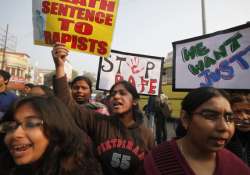Students in Chicago hold vigil for Delhi gang-rape victim
New York, Jan 6: Indian-Americans in Chicago, led by students of two leading universities, held a protest meet and candlelight vigil in memory of the Delhi gang-rape victim and sought change in India's rape laws

New York, Jan 6: Indian-Americans in Chicago, led by students of two leading universities, held a protest meet and candlelight vigil in memory of the Delhi gang-rape victim and sought change in India's rape laws and strict conviction of the accused to help reduce crime against women.
Indian students pursuing graduate studies at the University of Chicago and Northwestern University organized the meet on Friday to condemn the brutal gang-rape of the 23-year-old physiotherapy student who died in a Singapore hospital after battling for life for almost two weeks.
The students discussed policy recommendations that can be implemented to reduce crime against women.
They held placards that read 'No committees, we demand speedy justice', 'This world also belongs to women, respect them' and 'Say no to politicians with rape charges' as they demanded "speedy justice" and "strict conviction" of those accused of committing crimes against women.
Among the recommendations made by the students was broadening the definition of rape in Indian laws to include sexual abuse after marriage.
"Incumbent rape laws that include archaic and often imprecise language such as 'outraging the modesty of women' need to change. All forms of sexual assault, including marital rape must be punishable by law," Aman Chitkara, a public policy student at the University of Chicago, said.
The students also demanded speedy passage of the women's reservation bill in the Indian parliament. The group suggested that professional counselling centres should be set up for rape victims and their families to help them return to normalcy.
"We need to help more and more rape victims to resume normal lives, as this will reduce the perception of rape as an act of subjugation. Consequently its incidence will go down," an organizer of the meet Harsh Taneja said.
Subramanian, a PhD candidate at Northwestern University, said efforts should be made to improve the lives of Dalit women in villages, where physical and sexual oppression are regarded as "ordinary aspects" of daily life and not reported as a crime.
The students held a candlelight vigil to pay homage to the Delhi rape victim.
Indian students pursuing graduate studies at the University of Chicago and Northwestern University organized the meet on Friday to condemn the brutal gang-rape of the 23-year-old physiotherapy student who died in a Singapore hospital after battling for life for almost two weeks.
The students discussed policy recommendations that can be implemented to reduce crime against women.
They held placards that read 'No committees, we demand speedy justice', 'This world also belongs to women, respect them' and 'Say no to politicians with rape charges' as they demanded "speedy justice" and "strict conviction" of those accused of committing crimes against women.
Among the recommendations made by the students was broadening the definition of rape in Indian laws to include sexual abuse after marriage.
"Incumbent rape laws that include archaic and often imprecise language such as 'outraging the modesty of women' need to change. All forms of sexual assault, including marital rape must be punishable by law," Aman Chitkara, a public policy student at the University of Chicago, said.
The students also demanded speedy passage of the women's reservation bill in the Indian parliament. The group suggested that professional counselling centres should be set up for rape victims and their families to help them return to normalcy.
"We need to help more and more rape victims to resume normal lives, as this will reduce the perception of rape as an act of subjugation. Consequently its incidence will go down," an organizer of the meet Harsh Taneja said.
Subramanian, a PhD candidate at Northwestern University, said efforts should be made to improve the lives of Dalit women in villages, where physical and sexual oppression are regarded as "ordinary aspects" of daily life and not reported as a crime.
The students held a candlelight vigil to pay homage to the Delhi rape victim.